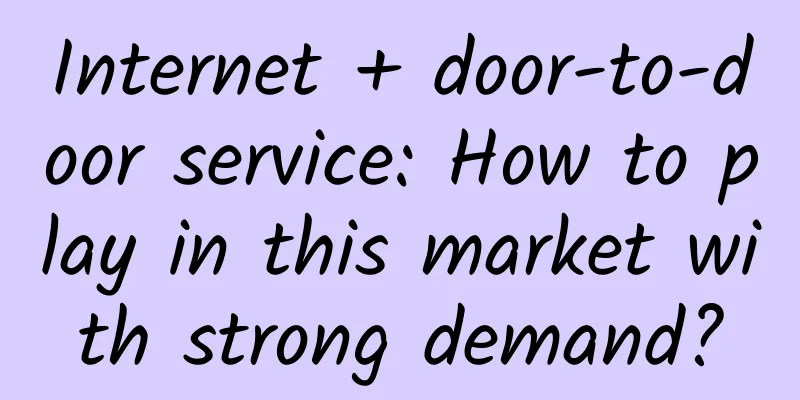Internet + door-to-door service: How to play in this market with strong demand?

|
Penguin Intelligence | Research and Production Research conclusions: 1. Platform-level O2O companies pay more attention to traffic categories, usually choose to control entry services through self-operation, and expand service categories through third-party cooperation and investment; 2. The difficulty of door-to-door service lies in the balance between supply and demand, and the problem faced by most platforms at this stage is insufficient supply; 3. Door-to-door service is just a form. The value of the door-to-door economy lies in the future transformation of the traditional service industry supply chain and the upgrading of the entire service industry. Preface : The rise of the “door-to-door economy” The home delivery economy has suddenly become a new opportunity that several platform-level O2O companies have bet on. The earliest O2O platform to enter this field is 58.com. Since the launch of the 58 Home Delivery platform last year, it has continuously deployed the entire home delivery economy field through investment and cooperation. This year, Meituan and Dianping also launched door-to-door services, showing an open and cooperative attitude. The e-commerce platform JD.com also regards door-to-door services as a crucial part of its O2O construction, not only establishing an independent O2O subsidiary, but also launching an independent home service app "JD.com Home Delivery". 1. What services does the door-to-door economy mainly refer to? 1. Takeaway and housekeeping: Takeout and housekeeping are inherently "door-to-door" services. Before the explosion of mobile Internet, ordering food and calling for cleaning services by phone was already a popular lifestyle. Therefore, takeout and housekeeping are also the first two categories to develop in the door-to-door economy. Relatively speaking, takeout O2O and housekeeping O2O have been exploring existing markets for a long time. 2. Laundry, manicure, massage, hairdressing and beauty: The second wave of door-to-door services has also given rise to new terms such as "door-to-door economy" and "lazy economy". Among them, laundry is slightly different. Door-to-door laundry focuses more on the operational capabilities of terminal logistics. Manicure, massage, and beauty industries focus on the management and training capabilities of service personnel. 3. Aftermarket, repairs: Some of them also come in the form of door-to-door services, such as door-to-door car washing and door-to-door maintenance. 4. Fresh food and groceries: Different from delivering “people” (service personnel), fresh food and groceries mainly deliver goods. Due to the special nature of the category, fresh food and groceries have higher requirements for delivery time, which is difficult to achieve under the traditional trunk logistics system. With the popularization of mobile Internet and the use of social resources, the opportunity of door-to-door delivery services for fresh food and groceries has once again attracted attention. 2. Why are platform-level players optimistic about the door-to-door economy? Why are O2O platforms with traffic and users such as 58.com, JD.com, Meituan, and Dianping so optimistic about the door-to-door economy and even regard door-to-door service as a future strategic direction? 1. The service industry market is huge, offline formats are underdeveloped, and standardization is low. This is the general background for the popularization of the O2O or Internet+ concept. The market is large but immature, and the development speed lags far behind user demand. This is an opportunity for the Internet to enter the entire traditional service industry. 2. Some home services have a high frequency of consumption and belong to the category of traffic entry. Platform-level companies need to maintain their entry advantages and derive other profit models through the control of traffic categories. Therefore, we can see that the home services chosen by companies such as 58, JD.com, and Meituan are generally high-frequency entry services, such as takeout, housekeeping, and fresh food. In order to maintain control, platform-level companies also basically operate traffic categories in a self-operated manner. Currently, Meituan’s daily takeaway orders have exceeded 2 million. 58 Daojia chooses to operate housekeeping by itself, and JD Daojia chooses to operate fresh food by itself. These categories are basically selected based on their own advantages + traffic entrance considerations. 3. Expand service categories to meet user needs. In addition to maintaining control over traffic categories through self-operation, platform-level companies also need to expand service categories and solve user needs in one stop to improve stickiness. The common practice is to open up and hand over most service categories outside of self-operated categories to third-party partners, especially low-frequency and heavy service categories. Currently, 58.com, JD.com and Meituan are also becoming increasingly aggressive in cooperation and investment. 3. What are the difficulties in the door-to-door economy? Home service is just a form. The core of the home service economy's transformation of the traditional service industry is to reorganize and manage service personnel, change their income structure, meet user needs, and transform the original supply system. 1. Supply and demand balance issues: Whether it is housekeeping, manicure, or massage, all categories that involve service personnel visiting the home face the problem of balancing supply and demand. In most cases, the supply side of the door-to-door service category is difficult to keep up with user demand, and the expansion of the platform also depends on the speed of recruiting and training service personnel. Take housekeeping as an example. Usually, an aunt in the industry receives about 2.5 orders per day. If the platform wants to reach more than 10,000 orders per day, it means that at least 4,000 aunts are needed. Wan Yong, CEO of Ayibang, believes that 80% is a reasonable capacity ratio. If it is higher than this ratio, it means that the capacity is insufficient, that is, the Ayibang cannot keep up with the orders. If it is lower than this ratio, it means that the supply is too small, there are not so many orders, and the Ayibang is idle. At this stage, the problem faced by most door-to-door service platforms is insufficient supply. 2. User habit issues: Except for take-out, housekeeping and other "naturally" door-to-door service categories, most door-to-door services require cultivating user habits. For example, door-to-door manicures and door-to-door massages require an education process for both service personnel and users. According to He Liu, co-founder of DianDao Massage, when users place their first order, more than half choose to have the service in a public place, such as an office or a cafe. After breaking the service system of physical stores, how to cultivate user habits is also a common problem in the door-to-door economy. 3. Transformation of the supply chain: The value of door-to-door service, in addition to better meeting user needs and increasing the income level of practitioners, lies in the greater opportunity of changing the supply chain system of the original industry. For food delivery platforms like Ele.me and Meituan Waimai, which have 2 million orders a day, can they transform the raw material supply system of merchants, improve the operating efficiency of restaurants, and improve the service level of the entire industry? For home service platforms like e-daixi and Ayibang, in addition to changing users' consumption habits, can they also improve the service quality of the entire industry and create industry standards? These are the core values of the future door-to-door economy or the development of the entire O2O field, and they are also the biggest difficulties. (Analyst for this issue: Tao Ran) |
<<: "Internet +" reshapes smart home
Recommend
How does the painkiller know where I hurt? Do you knock on my whole body and ask?
Surprise check: Do you have any painkillers in yo...
Hackers attacked Sony and Blizzard crazily: finally caught by FBI
Everyone must remember the bad behavior of the ha...
China Electric Vehicle Charging Infrastructure Promotion Alliance: As of September 2021, China's charging infrastructure has reached 2.223 million units, becoming the world's largest charging network
Currently, China is the world's largest new e...
Methodology for operating top short video influencers!
Short videos in the field of magic also attract p...
Are you still missing an ecosystem to become a “great” Internet company?
Is it reliable for startups to build their own ec...
Shock! Is the "skin-beautifying" baby cream actually a devilish trap for your baby's health?
An incident previously exposed on the Internet ca...
Case Analysis: How to use the AARRR model to increase user growth?
This article takes Luckin Coffee as an example. I...
The discovery of the battery was an accident
Batteries are indispensable in our daily lives, b...
"Personal Nutritionist" (27 video lessons)
"Personal Nutritionist" (27 video lesso...
Why do I need to be on an empty stomach for blood draw? Does drinking water count as being on an empty stomach? I finally figured it out today.
For hospitalization, blood draws are usually done...
Chongqing finally welcomes artificial rainfall! Experts: This cloud has been "audited"
In recent days, News of high temperature and drou...
New brand, IP marketing methodology that is unwilling to be disclosed!
The global economy is recovering and growing in 2...
WeChat 8.0.6 iOS version is officially launched with these 6 major changes
In actual testing, although there are no major fu...
As Voyager gets farther and farther away from the sun, why does the resistance increase?
The universe is almost a vacuum, so flying in the...
7 open source software that supports the entire Internet era
Open source software has now become the supportin...





![[Smart Farmers] From the Sea to Shandong Cuisine Table - The Magical Journey of Sea Intestines](/upload/images/67f236464da6a.webp)



